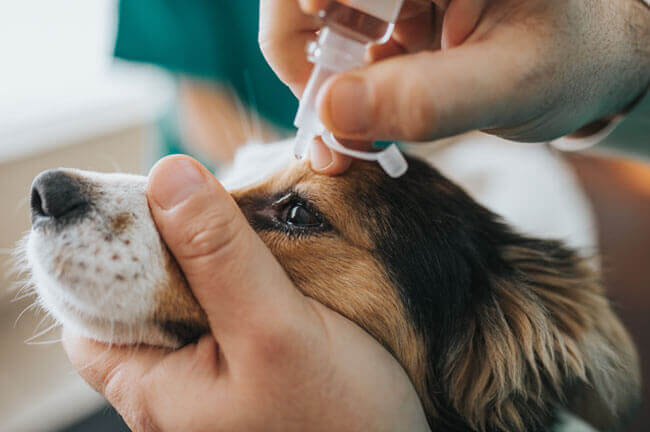Pink eye is a fairly common malady among both children and adults in Madison, WI, characterized by that dreaded reddish, watery eye. Although it’s mostly heard of as a human concern, some pet owners might ask the question, “Can my dog get pink eye in Madison, WI?” The answer, unfortunately, is yes. Conjunctivitis, or pink eye, appears in dogs just like it does in humans, with very similar symptoms and causes.
What Are Symptoms of a Dog with Pink Eye in Madison, WI?
Pink eye in dogs is irritation in the lining of the eye, eyelid, and third eyelid, which make up the conjunctiva. The symptoms of pink eye in dogs vary slightly depending on the variety, but there are several things they generally have in common.
Red Eye
The characterizing symptom of the condition, this redness can spread over the eyelid, third eyelid, eye, or all three.
Puffy Eyelids
In addition to redness, the eyelids may become swollen due to constant irritation.
Eye Discharge
Eye discharge may be watery or mucoid and can range in color from clear to yellow or green. It may be present in one or both eyes.
Stringy Discharge
The stringy discharge will be easily visible as it will likely stick in the pooch’s fur and face.
Eye Pain and Irritation
Your dog may attempt to relieve the discomfort by squinting, which will keep the eye more hydrated and avoid sensitivity caused by light.
Your dog may also paw or rub at the eyes in an attempt to relieve itchiness and irritation.
Eyelids Sticking Together
This symptom is seen most severely in puppies, but it is also present in adult dogs.
What Are the Different Types and Causes of Pink Eye in Dogs?
There is a variety of different types of conjunctivitis, each of which has its own distinct causes and treatment. It is important to see a veterinarian in Madison, WI, and get a correct diagnosis of which type of conjunctivitis your dog is suffering from, as the treatment that works for one type might not work for a different variety.
There are 5 basic types of conjunctivitis. Each one results in irritation of the dog’s conjunctiva, and all are treatable with appropriate veterinary intervention.
Viral Conjunctivitis
Viral conjunctivitis is can be caused by several different types of viruses. Depending on the type, it may be contagious to other dogs, but it is very rare for it to spread to humans.
Bacterial Conjunctivitis
Bacterial conjunctivitis is usually caused by a Strep or Staph infection. It can be seen in adult dogs as well as puppies. Bacterial conjunctivitis may be able to spread from one dog to another, but it is very rare for it to spread to humans.
Follicular or Allergic Conjunctivitis
Follicular Conjunctivitis is caused by an irritant in the eye leading to immune stimulation, which causes the lymphoid follicles to become enlarged.
The irritant may be dust or debris, or it could be an allergen such as hay or pollen. Any type of airborne irritant could cause follicular conjunctivitis.
Keratoconjunctivitis Sicca
Keratoconjunctivitis (KCS) is commonly known as dry eye. In KCS, the dog’s conjunctiva becomes inflamed due to a lack of tear production.
There are a number of reasons a dog may not produce enough tears to keep her eye hydrated, but it is most commonly idiopathic, meaning there is no specific underlying cause.
Other causes include distemper, hypothyroidism, and some medications. In order to treat pink eye with this cause, KCS–and the reason for it–must first be addressed.
Once this is determined, the veterinarian will prescribe appropriate medications as needed and likely give you some eye drops to help with your dog’s discomfort.
Parasitic Conjunctivitis
Parasitic conjunctivitis is very rare in dogs, especially in the Midwest. If your dog has travelled to other states or countries, it may be more likely.
With this form of pink eye, the dog’s eye is irritated by a parasite lodged in the conjunctiva, which causes a great deal of irritation.
Know the Common Symptoms of Pink Eye in Dogs in Madison, WI So You Can Get Them the Help They Need
Pink eye is a condition that is present in dogs just as it is in humans. Similarly, it has a number of different types, causes, and treatments.
If your dog has been pawing at her eyes frequently, has discharge from one or both eyes, or has any of the other symptoms related to pink eye, getting her checked out at a veterinary clinic and monitoring her will help you get to the bottom of what is causing the uncomfortable eye condition and how to get her back to feeling like herself.
If you have further questions on whether or not your dog has pink eye reach out to your veterinarian at Petcare Animal Hospital at 608-833-6585.
About PetCare Animal Hospital
Since 1975, Petcare Animal Hospital has been serving the Madison, WI pet community with the highest standards of care. We truly believe that pets should be treated like family, so we give them the same care we would expect for our own pets.
